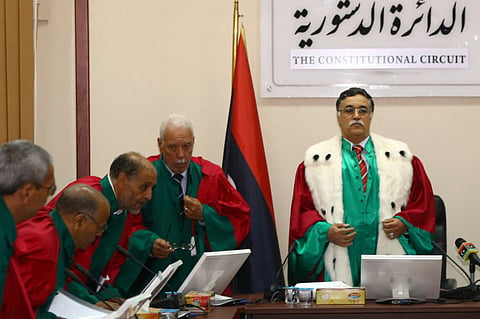Maiteeq to step down as Libya prime minister
Abdullah Al Thani will head interim government after Supreme Court ruling

Tripoli: Libya’s General National Congress, or interim parliament, said Monday it would comply with a supreme court ruling that Prime Minister Ahmad Maiteeq’s election in early May was unconstitutional.
“The congress complied with the judiciary’s decision,” Salah Al Makhzum, a vice-president of the GNC, told a press conference. He added that “in line with this decision the head of the interim government is Abdullah Al Thani,” the outgoing prime minister who refused to hand over power to Maiteeq’s cabinet pending the court’s decision.
Outgoing prime minister Abdullah Al Thani had refused to recognise Maiteeq’s government, saying he would await the judiciary’s decision before handing over power.
But Maiteeq convened his first cabinet meeting last week despite Al Thani’s objections, and the two rival premiers disputed power in Tripoli, laying claim to the largely lawless North African nation’s huge reserves from oil and gas.
“The court has judged the election of Maiteeq at the General National Congress [the interim parliament] as unconstitutional,” a judge at the court said on Monday after a short hearing.
The ruling would be examined by the administrative court later on Monday, lawyers said.
Al Thani announced his resignation earlier this year after an armed attack on his family, but he insisted that his successor should be chosen by a new parliament rather than its contested predecessor and refused to recognise Maiteeq’s cabinet.
After refusing to hand over power, Al Thani convened his cabinet last week as Maiteeq’s government held its first session, reportedly in a luxury hotel since his predecessor was at the time occupying the seat of government.
The political standoff between the rival cabinets amid rising unrest across the country allowed rogue general Khalifa Haftar to press an offensive against Islamists in the restive eastern city of Benghazi.
Haftar launched the attack, dubbed “Operation Dignity”, last month with troops from his so-called National Army. He has rallied support among the public and members of the security forces have joined his forces.
Near daily attacks in the eastern city of Benghazi, cradle of the 2011 revolt against dictator Muammar Gaddafi, have killed dozens of members of the security forces. No group has claimed the attack, but they have been blamed on Islamist militias based in the city.
A source in Maiteeq’s office said his cabinet had discussed security issues in their first meeting.
Maiteeq, 42, an independent backed by the Islamists, had been due to lead the country for a short interim period until June 25, when the country is due to hold an election to replace the congress.
He did not immediately comment. If he accepts the court’s decision, Al Thani is expected to remain in office until the June 25 vote is held.
Maiteeq’s election took place at a second session of the GNC in early May, days after gunmen stormed the building to interrupt an earlier ballot.
Several liberal lawmakers accused Islamist blocs within the interim parliament of allowing late arrivals at the session to cast their votes after the initial result was announced to make up the 121 votes needed, after Maiteeq had garnered only 113 votes.
The GNC’s vice-president, liberal MP Ezz Al Deen Al Awami, had called Maiteeq’s installation as prime minister a “coup d’etat.”
Maiteeq would have been Libya’s fifth premier since the revolution that ousted Gaddafi in 2011.
Successive governments in Tripoli have failed to stamp their authority on militias of rebels who fought Gaddafi and have refused to surrender their arms or join the regular security forces.
The GNC was elected in July 2012, in Libya’s first ever free polls, almost one year Gaddafi’s ouster.
Its legitimacy was challenged after the GNC prolonged its mandate, due to expire last February, until December 2014.
Sign up for the Daily Briefing
Get the latest news and updates straight to your inbox



